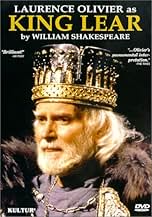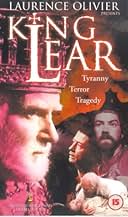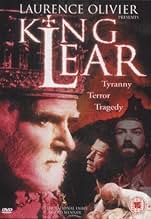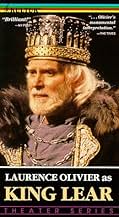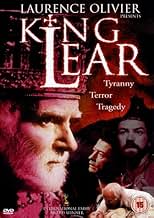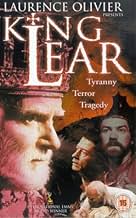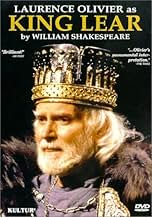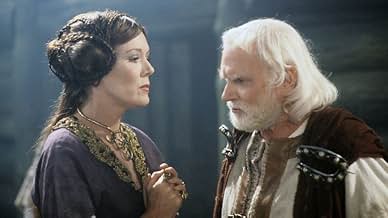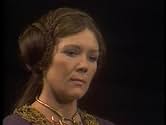Aging King Lear invites disaster when he abdicates to his two disloyal and obsequious daughters while rejecting the one who truly loves him.Aging King Lear invites disaster when he abdicates to his two disloyal and obsequious daughters while rejecting the one who truly loves him.Aging King Lear invites disaster when he abdicates to his two disloyal and obsequious daughters while rejecting the one who truly loves him.
- Won 1 Primetime Emmy
- 2 wins & 3 nominations total
- Director
- Writer
- All cast & crew
- Production, box office & more at IMDbPro
Featured reviews
This TV production was Laurence Olivier's final great performance, playing Lear at the age of 75 (beyond him perhaps on stage but cleverly done here).
He is supported by a large cast of stage actors - Dorothy Tutin, Anna Calder-Marshall and Diana Rigg as his daughters; Robert Lindsay and David Threlfall as the warring brothers Edmund and Edgar; Colin Blakely as Kent; Leo McKern as Gloucester; John Hurt as The Fool - all of which make their impact. The staging is memorable and pulls the viewer in to the action.
Comparable to really being there watching the greats at work in the theatre, and a fantastic piece of television drama.
He is supported by a large cast of stage actors - Dorothy Tutin, Anna Calder-Marshall and Diana Rigg as his daughters; Robert Lindsay and David Threlfall as the warring brothers Edmund and Edgar; Colin Blakely as Kent; Leo McKern as Gloucester; John Hurt as The Fool - all of which make their impact. The staging is memorable and pulls the viewer in to the action.
Comparable to really being there watching the greats at work in the theatre, and a fantastic piece of television drama.
A very good version of _King Lear_ - Olivier plays it poignantly, you can see his Lear's overweening vanity and his profound humility. Robert Lindsay is my favourite Edmund ever - you immediately love him and wish him well despite the fact that he is a b*ftard (in all senses of the word - haha). Dorothy Tutin's Goneril has the most disapproving glare you have ever seen and her frolicking mutton act is painful to watch if you're a middle-aged woman. Hurt's fool is a wee bit too pathetic and Cordelia's weepiness is not appealing -- Diana Rigg's Regan is certainly convincing at getting across the hidden nastiness that outdoes Goneril. Gloucester is quite perfect in his rough affection. I've seen this many times and I still enjoy watching it for the nuances. The fight between Ed and Ed is a little much. It's too bad it looks quite so made-for-TV. I'm looking forward to Branagh blowing all the meanings up into big cartoons for us when he does his version of Olivier's _Lear_.
I am becoming increasingly aware that some of my favorite actors are just dumb, that they don't have a vision as grand as the work they are a part of. I don't know that this should be so surprising, given what it takes to be an actor.
Olivier both acts and directs here, and what we have is a shame because he just doesn't understand this play, the important half anyway. Half of the play is about the relationships among people, specifically about the parent-child relationship and its regal surrogate of fealty (the fool, Kent and Gloucester to the King). When Olivier is relating to one of these, he is marvelous.
But half of the play is about Lear's relationship to unseen demons, sprites, devils. He sees and relates to these as intensely and with as much duration as with the daughters. (This is mirrored by Gloucester who cannot see them.) In this part of the play, roughly the middle, the language comes alive as it takes us into the Elizabethan equivalent of science fiction. This is some of the best language in Shakespeare, which is to say the best stuff anywhere.
And what does Olivier give us? Mumbling, sometimes under the wind noise. The fulcrum of this magic is the sequence with the Fool and Poor Tom. It is the heart of the magic, which Shakespeare later amplified with the `trial.' Olivier cuts most of that, and gives us a muddle. (Literally, Tom wallowing in the mud.)
The music is horrid, as it is with his much earlier Hamlet. The swordplay is bombastic. The sets are cheesy, especially the faux Stonehenge. If he understood the importance of Stonehenge, why drop the notion of magic in the core of the play? I just don't get it: I don't understand how he couldn't get it.
At the very last page, Lear kneels over the dead Cordelia and says `my poor fool is hanged.' Then looking for life in a magical revival asks to have HER button undone, which likely undoes a garment like that we have seen on the long-lost Fool. Rich stuff that, as big a twist as `Sixth Sense.' But Olivier slurs over on his way to rambling about dogs and rats and then asks for HIS button to be undone. My my.
Advice: Lear is one of the very best of the plays. I'll grant that Olivier is a fine actor, but this is a very poor offering indeed. Ignore.
Olivier both acts and directs here, and what we have is a shame because he just doesn't understand this play, the important half anyway. Half of the play is about the relationships among people, specifically about the parent-child relationship and its regal surrogate of fealty (the fool, Kent and Gloucester to the King). When Olivier is relating to one of these, he is marvelous.
But half of the play is about Lear's relationship to unseen demons, sprites, devils. He sees and relates to these as intensely and with as much duration as with the daughters. (This is mirrored by Gloucester who cannot see them.) In this part of the play, roughly the middle, the language comes alive as it takes us into the Elizabethan equivalent of science fiction. This is some of the best language in Shakespeare, which is to say the best stuff anywhere.
And what does Olivier give us? Mumbling, sometimes under the wind noise. The fulcrum of this magic is the sequence with the Fool and Poor Tom. It is the heart of the magic, which Shakespeare later amplified with the `trial.' Olivier cuts most of that, and gives us a muddle. (Literally, Tom wallowing in the mud.)
The music is horrid, as it is with his much earlier Hamlet. The swordplay is bombastic. The sets are cheesy, especially the faux Stonehenge. If he understood the importance of Stonehenge, why drop the notion of magic in the core of the play? I just don't get it: I don't understand how he couldn't get it.
At the very last page, Lear kneels over the dead Cordelia and says `my poor fool is hanged.' Then looking for life in a magical revival asks to have HER button undone, which likely undoes a garment like that we have seen on the long-lost Fool. Rich stuff that, as big a twist as `Sixth Sense.' But Olivier slurs over on his way to rambling about dogs and rats and then asks for HIS button to be undone. My my.
Advice: Lear is one of the very best of the plays. I'll grant that Olivier is a fine actor, but this is a very poor offering indeed. Ignore.
The key to Olivier's performance is also the key to the play. Lear has been an absolute monarch for so long that he thinks of his royal status as a personal attribute. He therefore takes for granted that he will still be treated as a king (without the burden of royal responsibilities) when he has given up the land and authority that are the basis of his power. His attitude recalls the words of Shakespeare's Richard II: "Not all the waters of the rough rude sea can wash the balm from an anointed king." Events in that play prove how wrong he was.
Lear's position has also isolated him from the realities of everyday life and genuine human emotion. His tragedy is the price he pays for rediscovering those realities. His nobility is shown by his willingness to acknowledge his error and pay the price: "Oh I have ta'en too little care of this..." Olivier's performance, more than any other on film, shows this process of coming to terms with the realities of human life, and the falsity of court life; and being driven insane by the shock until his recognition of Cordelia brings him back. Olivier shows us what Lear is going through with hundreds of small gestures, movements, inflections of voice, and facial expressions. By comparison, he makes other actors in the role seem wooden, and he reveals how an "old fart" can regain his nobility by facing the truth.
Lear's position has also isolated him from the realities of everyday life and genuine human emotion. His tragedy is the price he pays for rediscovering those realities. His nobility is shown by his willingness to acknowledge his error and pay the price: "Oh I have ta'en too little care of this..." Olivier's performance, more than any other on film, shows this process of coming to terms with the realities of human life, and the falsity of court life; and being driven insane by the shock until his recognition of Cordelia brings him back. Olivier shows us what Lear is going through with hundreds of small gestures, movements, inflections of voice, and facial expressions. By comparison, he makes other actors in the role seem wooden, and he reveals how an "old fart" can regain his nobility by facing the truth.
10Sirona
The whole production was beclouded with grayness, as suits the theme of seeing/sight, yet the acting was elegiac. Diana Rigg and Dorothy Tutin were as seeming kindly as they were brutal. Robert Lindsay's Edmund was as poisonous as he was seemingly loving and loyal. But what I take away most specially was Olivier, as Lear, lifting a lock of his dead Cordelia's hair in his bowed hands to his face, taking a breath, a last scent. I cried. It was a most elegant summary of a parent's loss.
Did you know
- TriviaEsmond Knight (Old Man) previously appeared in all three Shakespearean films directed by Laurence Olivier: Henry V (1944), Hamlet (1948) and Richard III (1955).
- ConnectionsFeatured in The 36th Annual Primetime Emmy Awards (1984)
Details
- Release date
- Country of origin
- Official site
- Language
- Also known as
- 李爾王
- Production company
- See more company credits at IMDbPro
Contribute to this page
Suggest an edit or add missing content


